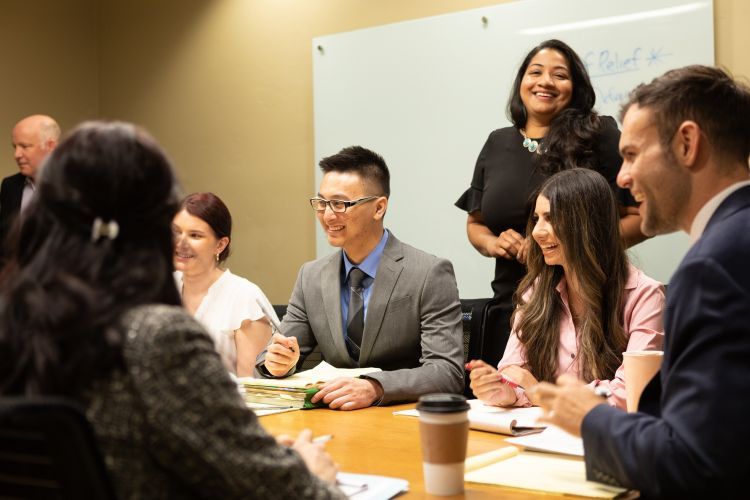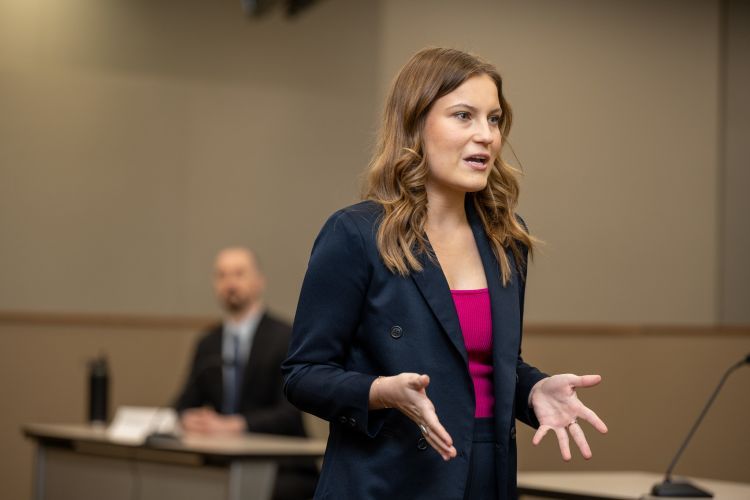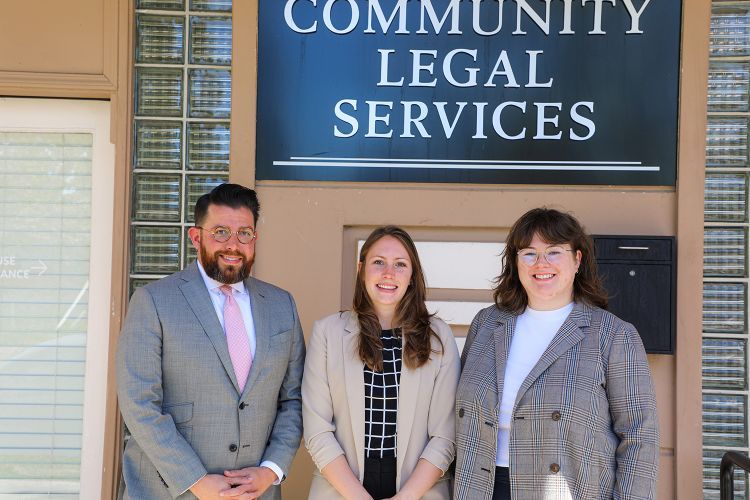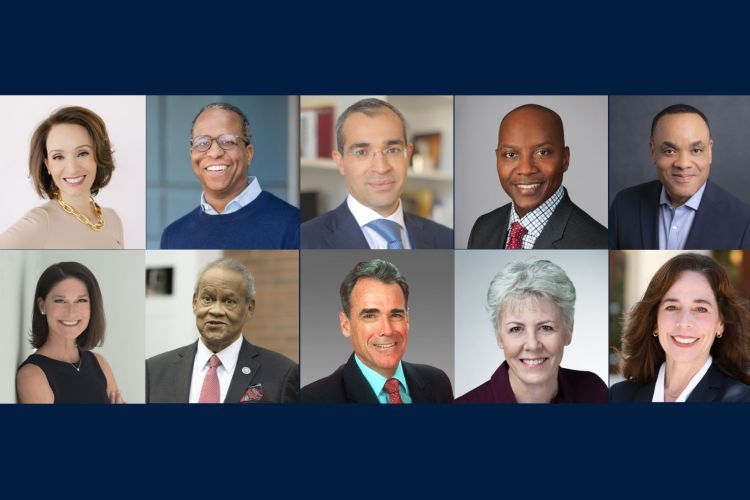Breadcrumb
McGeorge School of Law’s legal clinics change lives in Sacramento

(From left to right) Immigration Law Clinic Supervising Attorney Blake Nordahl, Katherine Linggi ’23, Justin Trinh ’23, former Staff Attorney Kishwer Vikaas, Shereen Ghaith ’23 and Cody McNearney ’22.
The McGeorge School of Law helped eliminate a staggering $162 million of criminal debt in the fall, worked with 80 Afghan refugees trying to remain in the United States and recovered more than $4 million for financial abuse victims.
The life-changing legal assistance is the work of students in the law school’s legal clinics, which have been providing free services to people in the Sacramento community since 1964.
"Taking part in the Immigration Law Clinic was the highlight of my time at McGeorge ... I made decisions on my clients’ cases that affect the rest of their lives.” - Yessica López ’22
Law students involved with the school’s seven legal clinics serve as legal counsel to low-income and underserved members of the community as they navigate a variety of legal challenges. Students represent criminal defendants, mediate prisoner civil rights claims and prompt legislative change.
“The clinics have been providing quality ethical and competent legal services for nearly 60 years to those who have no other means to access social justice,” said Clinical Professor of Law Melissa Brown, who serves as director of the legal clinics and supervises the Elder & Health Law Clinic. “Community Legal Services is committed to represent the ‘whole’ client, which often involves interdisciplinary collaboration and solutions.
“Students learn how to identify these issues, research, draft documents, case management skills and how to apply their legal education to benefit their clients. Our students carry these skills and values into their legal careers,” Brown said.
The clinics afford McGeorge students the invaluable opportunity to gain hands-on experience as they represent clients in probate, immigration, superior, bankruptcy and federal courts. They learn the art and skill of mediation and legislative advocacy. Clinic students learn to apply legal theory to practice, develop professional lawyering skills, gain practical experience advocating for clients and come to learn in a real way how lawyers change lives.
Four of the clinics are operated on-campus. Known collectively as Community Legal Services, they operate year-round as a law firm with up to 50 certified law students and seven attorneys. Students work with clients in the areas of bankruptcy, elder and health law, homeless advocacy and immigration law under the supervision of attorneys.
“Taking part in the Immigration Law Clinic was the highlight of my time at McGeorge because I got to interact with clients and guide them through the legal system,” said Yessica López ’22, who worked under the supervision of attorney Blake Nordahl. “I made decisions on my clients’ cases that affect the rest of their lives.”
Three off-campus clinics give students the opportunity to work in federal courts, prisons and the Legislature—the Federal Defender Clinic, the Legislative and Public Policy Clinic and the Prisoner Civil Rights Mediation Clinic.
McGeorge houses one of only two Federal Defender Clinics in the country where students handle bench and jury trials in federal court. In the Prisoner Civil Rights Mediation Clinic, students participate in all aspects of mediating claims such as excessive force that are filed in the Federal Court. Legislative and Public Policy Clinic students have a success record matching that of many professional lobbyists. Since the Legislative and Public Policy Clinic was established in 2015, students have drafted 17 bills that have been enacted into law—several of which were related to issues identified by Community Legal Services as calling for a legislative fix.
McGeorge was the sixth law school in the nation and the first on the West Coast to require students to complete two authentic law practice experiences. Law students’ participation in one or more of these clinics counts toward this experiential learning requirement, as does completing one of the more than 125 externship opportunities, including placements with state and federal trial and appellate court judges, state and federal agencies and non-profit organizations.
The clinics’ recent advocacy includes:
- Students involved in the Homeless Advocacy Clinic in the fall helped eliminate more than $162 million of criminal debt on approximately 622,000 traffic infractions, including living in a vehicle, camping, panhandling and other activities. The Sacramento Superior Court agreed to issue refunds to individuals from whom it illegally collected civil assessment fees.
- The Immigration Law Clinic represents non-citizens who otherwise would be unable to obtain legal representation. It hosted an Immigration Fair on campus on March 17. Through the fair, 24 students assisted 80 Afghan refugees with their applications for Temporary Protected Status.
- This spring, the Elder & Health Clinic is hosting a three-part elder abuse awareness roadshow called “‘NO.’ is a complete sentence: Say No to Elder Abuse!” The live theater events showcase professional actors performing scenes of common financial exploitation. The clinic partnered with Capital Stage for the interactive theater event that explores how financial elder abuse occurs and demonstrate how and why to say "no" to family, friends and solicitors. Several more roadshows are planned in the coming year.
- In 2021 and 2022, the Elder & Health Law Clinic recovered more than $4 million in assets for their elder financial abuse clients.
Community Legal Services has seen a continual increase in the number of people it serves, cases closed and economic benefit in the community. In 2021 and 2022, Community Legal Services generated more than $5 million in economic benefits, closed 699 cases, and provided legal assistance and representation that benefited 763 individual clients in addition to 1,104 members of their households.
Community Legal Services is located on McGeorge School of Law’s campus at 2925 34th Street in Sacramento. Requests for legal assistance are by appointment only. Community Legal Services can be reached by email at clsmcg@pacific.edu or by phone at 916-340-6080. Telephone hours are from 9 a.m.–12 p.m. and from 1:30–4 p.m. on weekdays.





